Effective Interpersonal Communication Skills: A Student's Perspective
VerifiedAdded on 2022/09/13
|8
|2107
|54
Essay
AI Summary
This essay explores the critical role of interpersonal communication skills in both academic and professional settings. The author emphasizes that effective communication, encompassing verbal and non-verbal cues, is essential for achieving objectives, building relationships, and navigating workplace challenges. The essay delves into various aspects of communication, including active listening, non-verbal communication, and the importance of adapting communication styles to different situations. It also addresses communication barriers, such as cultural differences and channel limitations, and suggests strategies for overcoming these obstacles. The author reflects on personal experiences, highlighting the impact of communication skills on teamwork and personal interactions. The essay concludes by emphasizing the need for continuous learning and adaptation to enhance communication skills for future professional success. The essay draws upon various research papers to support its arguments.
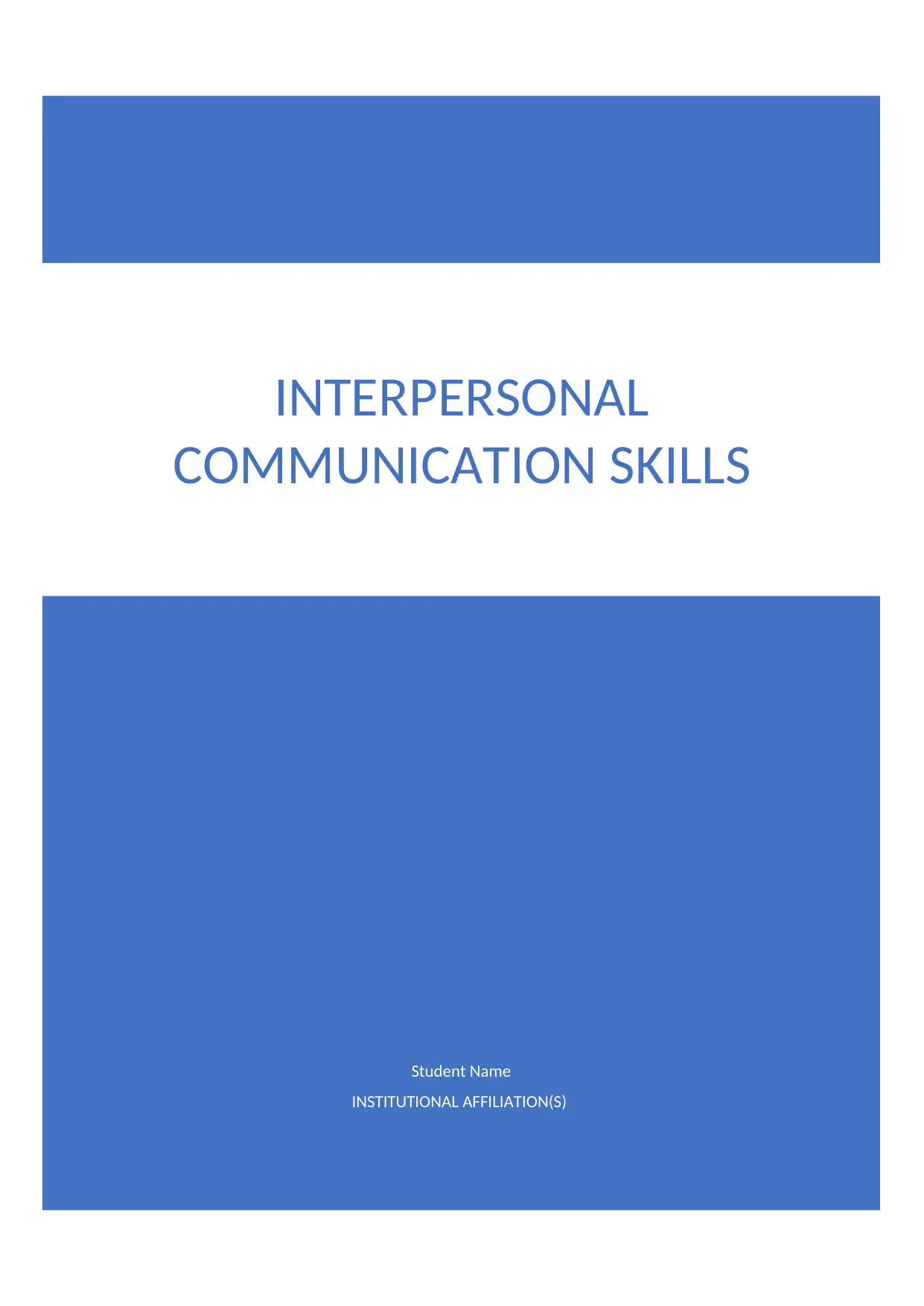
Student Name
INSTITUTIONAL AFFILIATION(S)
INTERPERSONAL
COMMUNICATION SKILLS
INSTITUTIONAL AFFILIATION(S)
INTERPERSONAL
COMMUNICATION SKILLS
Paraphrase This Document
Need a fresh take? Get an instant paraphrase of this document with our AI Paraphraser
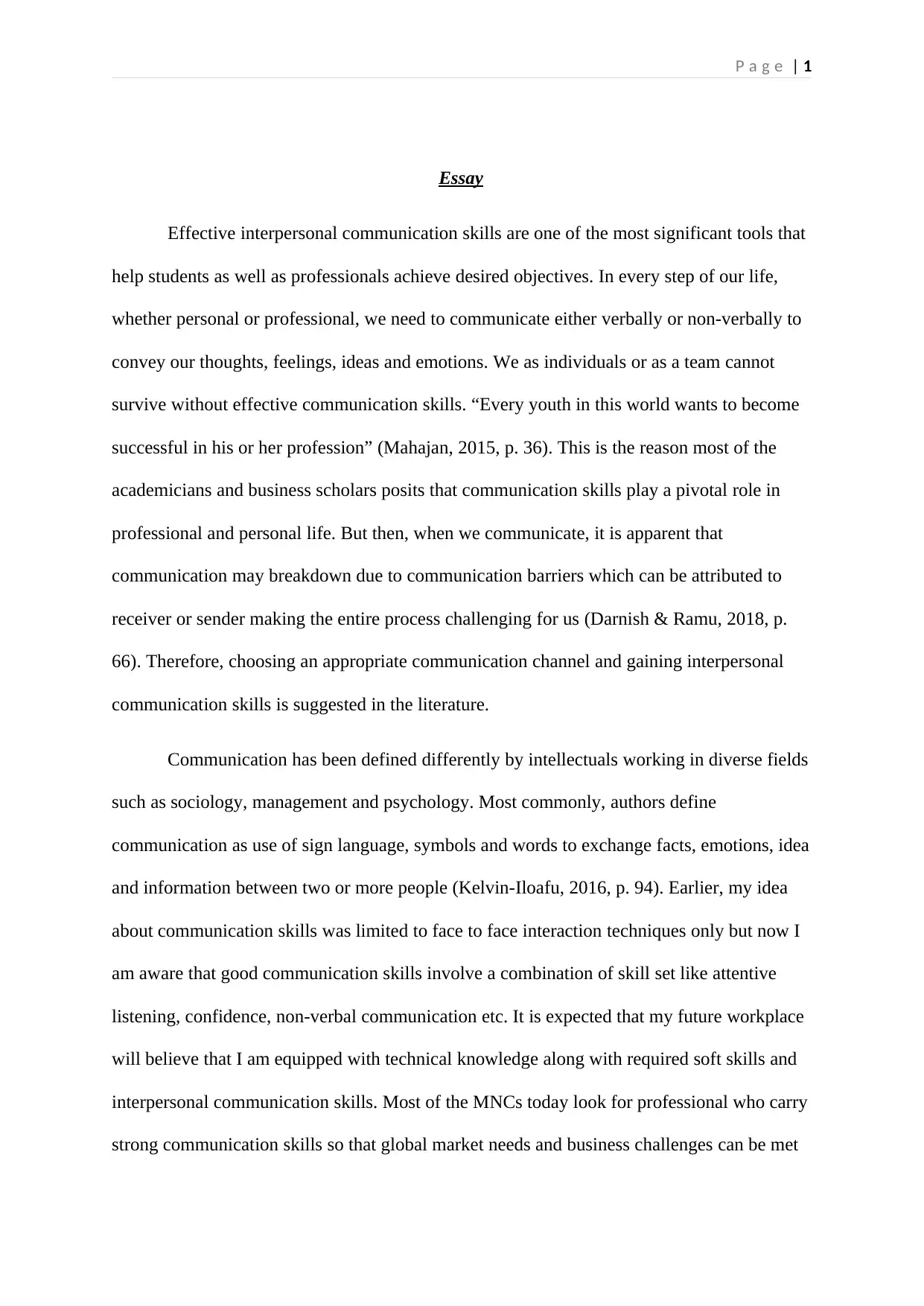
P a g e | 1
Essay
Effective interpersonal communication skills are one of the most significant tools that
help students as well as professionals achieve desired objectives. In every step of our life,
whether personal or professional, we need to communicate either verbally or non-verbally to
convey our thoughts, feelings, ideas and emotions. We as individuals or as a team cannot
survive without effective communication skills. “Every youth in this world wants to become
successful in his or her profession” (Mahajan, 2015, p. 36). This is the reason most of the
academicians and business scholars posits that communication skills play a pivotal role in
professional and personal life. But then, when we communicate, it is apparent that
communication may breakdown due to communication barriers which can be attributed to
receiver or sender making the entire process challenging for us (Darnish & Ramu, 2018, p.
66). Therefore, choosing an appropriate communication channel and gaining interpersonal
communication skills is suggested in the literature.
Communication has been defined differently by intellectuals working in diverse fields
such as sociology, management and psychology. Most commonly, authors define
communication as use of sign language, symbols and words to exchange facts, emotions, idea
and information between two or more people (Kelvin-Iloafu, 2016, p. 94). Earlier, my idea
about communication skills was limited to face to face interaction techniques only but now I
am aware that good communication skills involve a combination of skill set like attentive
listening, confidence, non-verbal communication etc. It is expected that my future workplace
will believe that I am equipped with technical knowledge along with required soft skills and
interpersonal communication skills. Most of the MNCs today look for professional who carry
strong communication skills so that global market needs and business challenges can be met
Essay
Effective interpersonal communication skills are one of the most significant tools that
help students as well as professionals achieve desired objectives. In every step of our life,
whether personal or professional, we need to communicate either verbally or non-verbally to
convey our thoughts, feelings, ideas and emotions. We as individuals or as a team cannot
survive without effective communication skills. “Every youth in this world wants to become
successful in his or her profession” (Mahajan, 2015, p. 36). This is the reason most of the
academicians and business scholars posits that communication skills play a pivotal role in
professional and personal life. But then, when we communicate, it is apparent that
communication may breakdown due to communication barriers which can be attributed to
receiver or sender making the entire process challenging for us (Darnish & Ramu, 2018, p.
66). Therefore, choosing an appropriate communication channel and gaining interpersonal
communication skills is suggested in the literature.
Communication has been defined differently by intellectuals working in diverse fields
such as sociology, management and psychology. Most commonly, authors define
communication as use of sign language, symbols and words to exchange facts, emotions, idea
and information between two or more people (Kelvin-Iloafu, 2016, p. 94). Earlier, my idea
about communication skills was limited to face to face interaction techniques only but now I
am aware that good communication skills involve a combination of skill set like attentive
listening, confidence, non-verbal communication etc. It is expected that my future workplace
will believe that I am equipped with technical knowledge along with required soft skills and
interpersonal communication skills. Most of the MNCs today look for professional who carry
strong communication skills so that global market needs and business challenges can be met
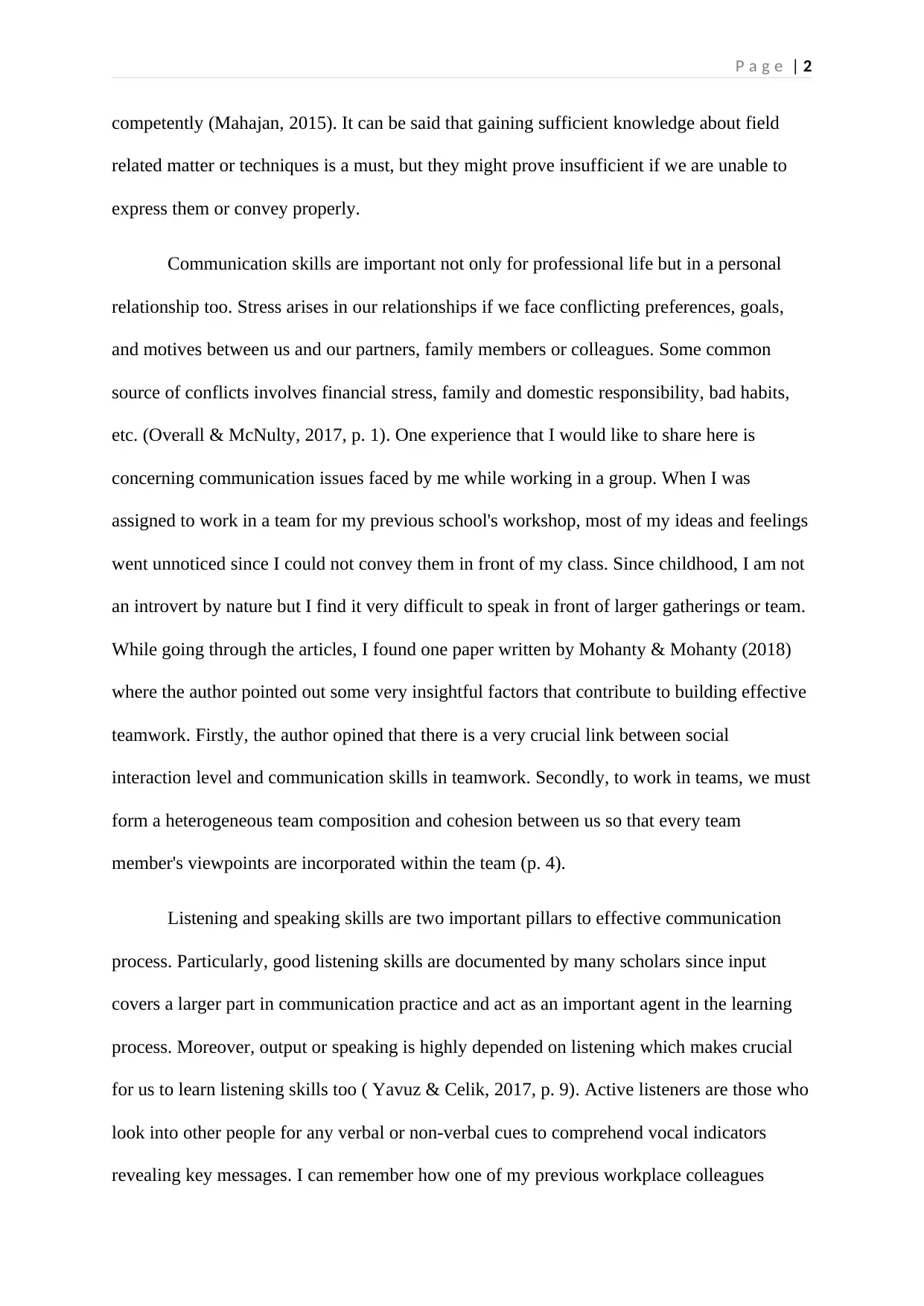
P a g e | 2
competently (Mahajan, 2015). It can be said that gaining sufficient knowledge about field
related matter or techniques is a must, but they might prove insufficient if we are unable to
express them or convey properly.
Communication skills are important not only for professional life but in a personal
relationship too. Stress arises in our relationships if we face conflicting preferences, goals,
and motives between us and our partners, family members or colleagues. Some common
source of conflicts involves financial stress, family and domestic responsibility, bad habits,
etc. (Overall & McNulty, 2017, p. 1). One experience that I would like to share here is
concerning communication issues faced by me while working in a group. When I was
assigned to work in a team for my previous school's workshop, most of my ideas and feelings
went unnoticed since I could not convey them in front of my class. Since childhood, I am not
an introvert by nature but I find it very difficult to speak in front of larger gatherings or team.
While going through the articles, I found one paper written by Mohanty & Mohanty (2018)
where the author pointed out some very insightful factors that contribute to building effective
teamwork. Firstly, the author opined that there is a very crucial link between social
interaction level and communication skills in teamwork. Secondly, to work in teams, we must
form a heterogeneous team composition and cohesion between us so that every team
member's viewpoints are incorporated within the team (p. 4).
Listening and speaking skills are two important pillars to effective communication
process. Particularly, good listening skills are documented by many scholars since input
covers a larger part in communication practice and act as an important agent in the learning
process. Moreover, output or speaking is highly depended on listening which makes crucial
for us to learn listening skills too ( Yavuz & Celik, 2017, p. 9). Active listeners are those who
look into other people for any verbal or non-verbal cues to comprehend vocal indicators
revealing key messages. I can remember how one of my previous workplace colleagues
competently (Mahajan, 2015). It can be said that gaining sufficient knowledge about field
related matter or techniques is a must, but they might prove insufficient if we are unable to
express them or convey properly.
Communication skills are important not only for professional life but in a personal
relationship too. Stress arises in our relationships if we face conflicting preferences, goals,
and motives between us and our partners, family members or colleagues. Some common
source of conflicts involves financial stress, family and domestic responsibility, bad habits,
etc. (Overall & McNulty, 2017, p. 1). One experience that I would like to share here is
concerning communication issues faced by me while working in a group. When I was
assigned to work in a team for my previous school's workshop, most of my ideas and feelings
went unnoticed since I could not convey them in front of my class. Since childhood, I am not
an introvert by nature but I find it very difficult to speak in front of larger gatherings or team.
While going through the articles, I found one paper written by Mohanty & Mohanty (2018)
where the author pointed out some very insightful factors that contribute to building effective
teamwork. Firstly, the author opined that there is a very crucial link between social
interaction level and communication skills in teamwork. Secondly, to work in teams, we must
form a heterogeneous team composition and cohesion between us so that every team
member's viewpoints are incorporated within the team (p. 4).
Listening and speaking skills are two important pillars to effective communication
process. Particularly, good listening skills are documented by many scholars since input
covers a larger part in communication practice and act as an important agent in the learning
process. Moreover, output or speaking is highly depended on listening which makes crucial
for us to learn listening skills too ( Yavuz & Celik, 2017, p. 9). Active listeners are those who
look into other people for any verbal or non-verbal cues to comprehend vocal indicators
revealing key messages. I can remember how one of my previous workplace colleagues
⊘ This is a preview!⊘
Do you want full access?
Subscribe today to unlock all pages.

Trusted by 1+ million students worldwide
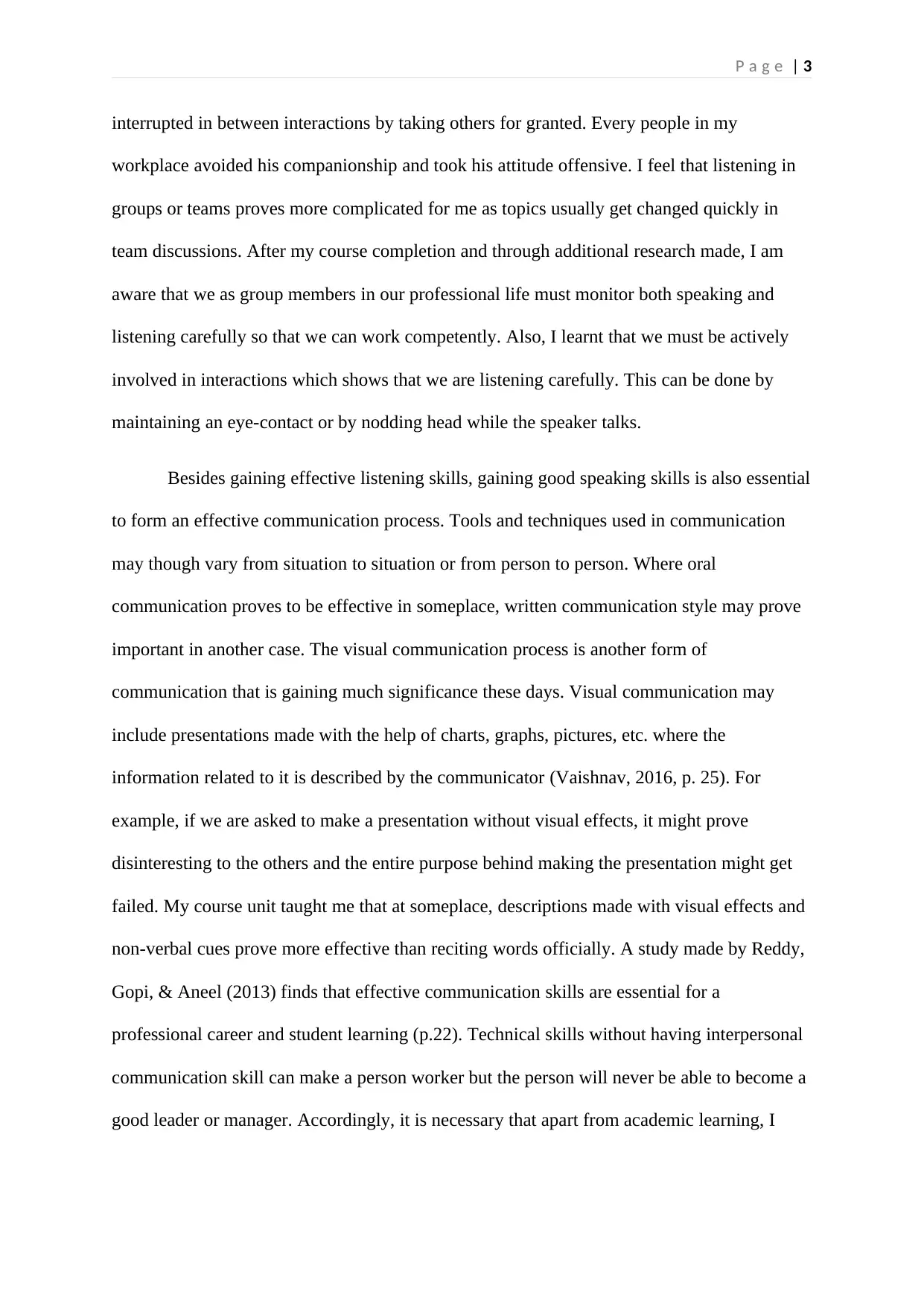
P a g e | 3
interrupted in between interactions by taking others for granted. Every people in my
workplace avoided his companionship and took his attitude offensive. I feel that listening in
groups or teams proves more complicated for me as topics usually get changed quickly in
team discussions. After my course completion and through additional research made, I am
aware that we as group members in our professional life must monitor both speaking and
listening carefully so that we can work competently. Also, I learnt that we must be actively
involved in interactions which shows that we are listening carefully. This can be done by
maintaining an eye-contact or by nodding head while the speaker talks.
Besides gaining effective listening skills, gaining good speaking skills is also essential
to form an effective communication process. Tools and techniques used in communication
may though vary from situation to situation or from person to person. Where oral
communication proves to be effective in someplace, written communication style may prove
important in another case. The visual communication process is another form of
communication that is gaining much significance these days. Visual communication may
include presentations made with the help of charts, graphs, pictures, etc. where the
information related to it is described by the communicator (Vaishnav, 2016, p. 25). For
example, if we are asked to make a presentation without visual effects, it might prove
disinteresting to the others and the entire purpose behind making the presentation might get
failed. My course unit taught me that at someplace, descriptions made with visual effects and
non-verbal cues prove more effective than reciting words officially. A study made by Reddy,
Gopi, & Aneel (2013) finds that effective communication skills are essential for a
professional career and student learning (p.22). Technical skills without having interpersonal
communication skill can make a person worker but the person will never be able to become a
good leader or manager. Accordingly, it is necessary that apart from academic learning, I
interrupted in between interactions by taking others for granted. Every people in my
workplace avoided his companionship and took his attitude offensive. I feel that listening in
groups or teams proves more complicated for me as topics usually get changed quickly in
team discussions. After my course completion and through additional research made, I am
aware that we as group members in our professional life must monitor both speaking and
listening carefully so that we can work competently. Also, I learnt that we must be actively
involved in interactions which shows that we are listening carefully. This can be done by
maintaining an eye-contact or by nodding head while the speaker talks.
Besides gaining effective listening skills, gaining good speaking skills is also essential
to form an effective communication process. Tools and techniques used in communication
may though vary from situation to situation or from person to person. Where oral
communication proves to be effective in someplace, written communication style may prove
important in another case. The visual communication process is another form of
communication that is gaining much significance these days. Visual communication may
include presentations made with the help of charts, graphs, pictures, etc. where the
information related to it is described by the communicator (Vaishnav, 2016, p. 25). For
example, if we are asked to make a presentation without visual effects, it might prove
disinteresting to the others and the entire purpose behind making the presentation might get
failed. My course unit taught me that at someplace, descriptions made with visual effects and
non-verbal cues prove more effective than reciting words officially. A study made by Reddy,
Gopi, & Aneel (2013) finds that effective communication skills are essential for a
professional career and student learning (p.22). Technical skills without having interpersonal
communication skill can make a person worker but the person will never be able to become a
good leader or manager. Accordingly, it is necessary that apart from academic learning, I
Paraphrase This Document
Need a fresh take? Get an instant paraphrase of this document with our AI Paraphraser
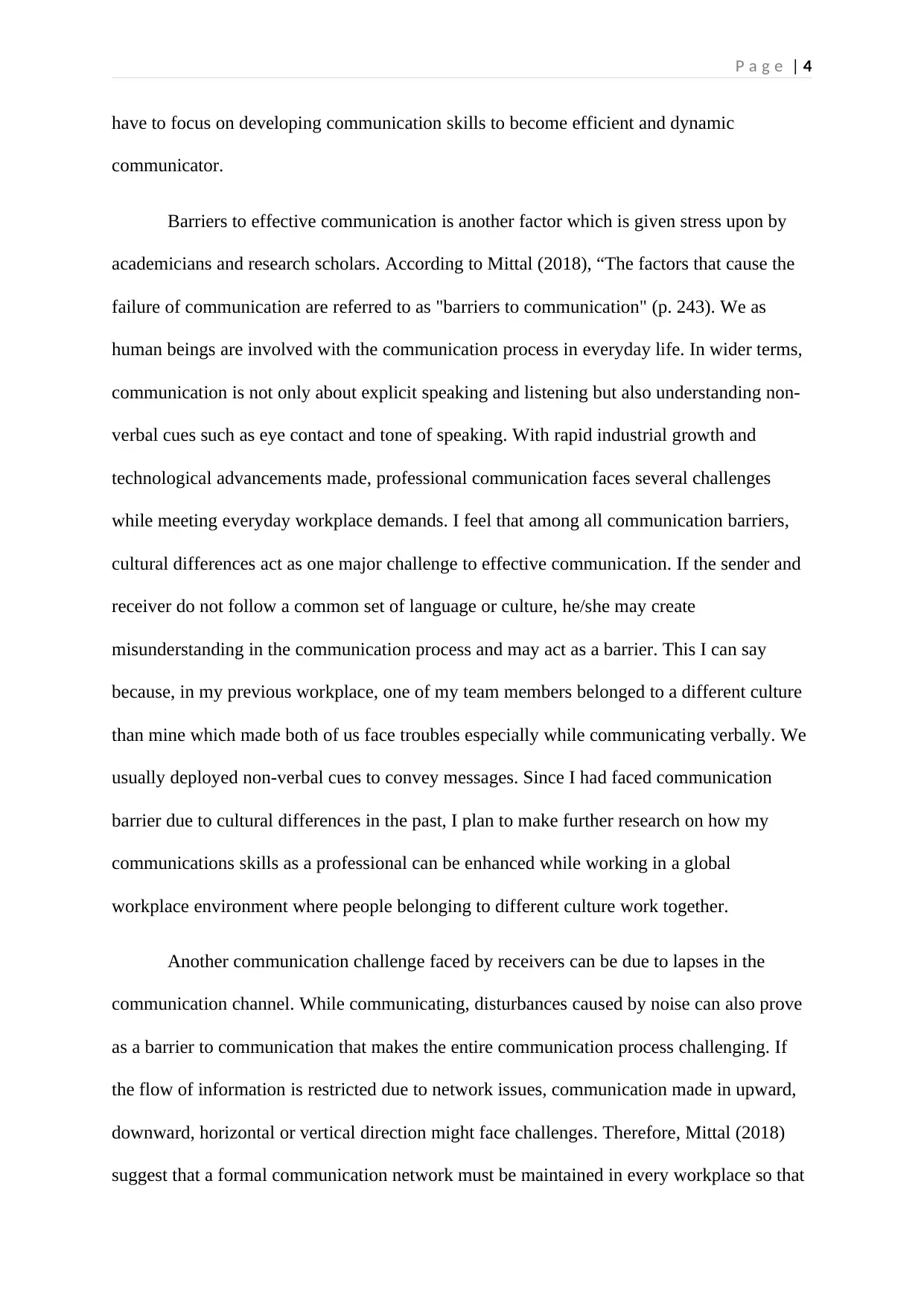
P a g e | 4
have to focus on developing communication skills to become efficient and dynamic
communicator.
Barriers to effective communication is another factor which is given stress upon by
academicians and research scholars. According to Mittal (2018), “The factors that cause the
failure of communication are referred to as "barriers to communication" (p. 243). We as
human beings are involved with the communication process in everyday life. In wider terms,
communication is not only about explicit speaking and listening but also understanding non-
verbal cues such as eye contact and tone of speaking. With rapid industrial growth and
technological advancements made, professional communication faces several challenges
while meeting everyday workplace demands. I feel that among all communication barriers,
cultural differences act as one major challenge to effective communication. If the sender and
receiver do not follow a common set of language or culture, he/she may create
misunderstanding in the communication process and may act as a barrier. This I can say
because, in my previous workplace, one of my team members belonged to a different culture
than mine which made both of us face troubles especially while communicating verbally. We
usually deployed non-verbal cues to convey messages. Since I had faced communication
barrier due to cultural differences in the past, I plan to make further research on how my
communications skills as a professional can be enhanced while working in a global
workplace environment where people belonging to different culture work together.
Another communication challenge faced by receivers can be due to lapses in the
communication channel. While communicating, disturbances caused by noise can also prove
as a barrier to communication that makes the entire communication process challenging. If
the flow of information is restricted due to network issues, communication made in upward,
downward, horizontal or vertical direction might face challenges. Therefore, Mittal (2018)
suggest that a formal communication network must be maintained in every workplace so that
have to focus on developing communication skills to become efficient and dynamic
communicator.
Barriers to effective communication is another factor which is given stress upon by
academicians and research scholars. According to Mittal (2018), “The factors that cause the
failure of communication are referred to as "barriers to communication" (p. 243). We as
human beings are involved with the communication process in everyday life. In wider terms,
communication is not only about explicit speaking and listening but also understanding non-
verbal cues such as eye contact and tone of speaking. With rapid industrial growth and
technological advancements made, professional communication faces several challenges
while meeting everyday workplace demands. I feel that among all communication barriers,
cultural differences act as one major challenge to effective communication. If the sender and
receiver do not follow a common set of language or culture, he/she may create
misunderstanding in the communication process and may act as a barrier. This I can say
because, in my previous workplace, one of my team members belonged to a different culture
than mine which made both of us face troubles especially while communicating verbally. We
usually deployed non-verbal cues to convey messages. Since I had faced communication
barrier due to cultural differences in the past, I plan to make further research on how my
communications skills as a professional can be enhanced while working in a global
workplace environment where people belonging to different culture work together.
Another communication challenge faced by receivers can be due to lapses in the
communication channel. While communicating, disturbances caused by noise can also prove
as a barrier to communication that makes the entire communication process challenging. If
the flow of information is restricted due to network issues, communication made in upward,
downward, horizontal or vertical direction might face challenges. Therefore, Mittal (2018)
suggest that a formal communication network must be maintained in every workplace so that
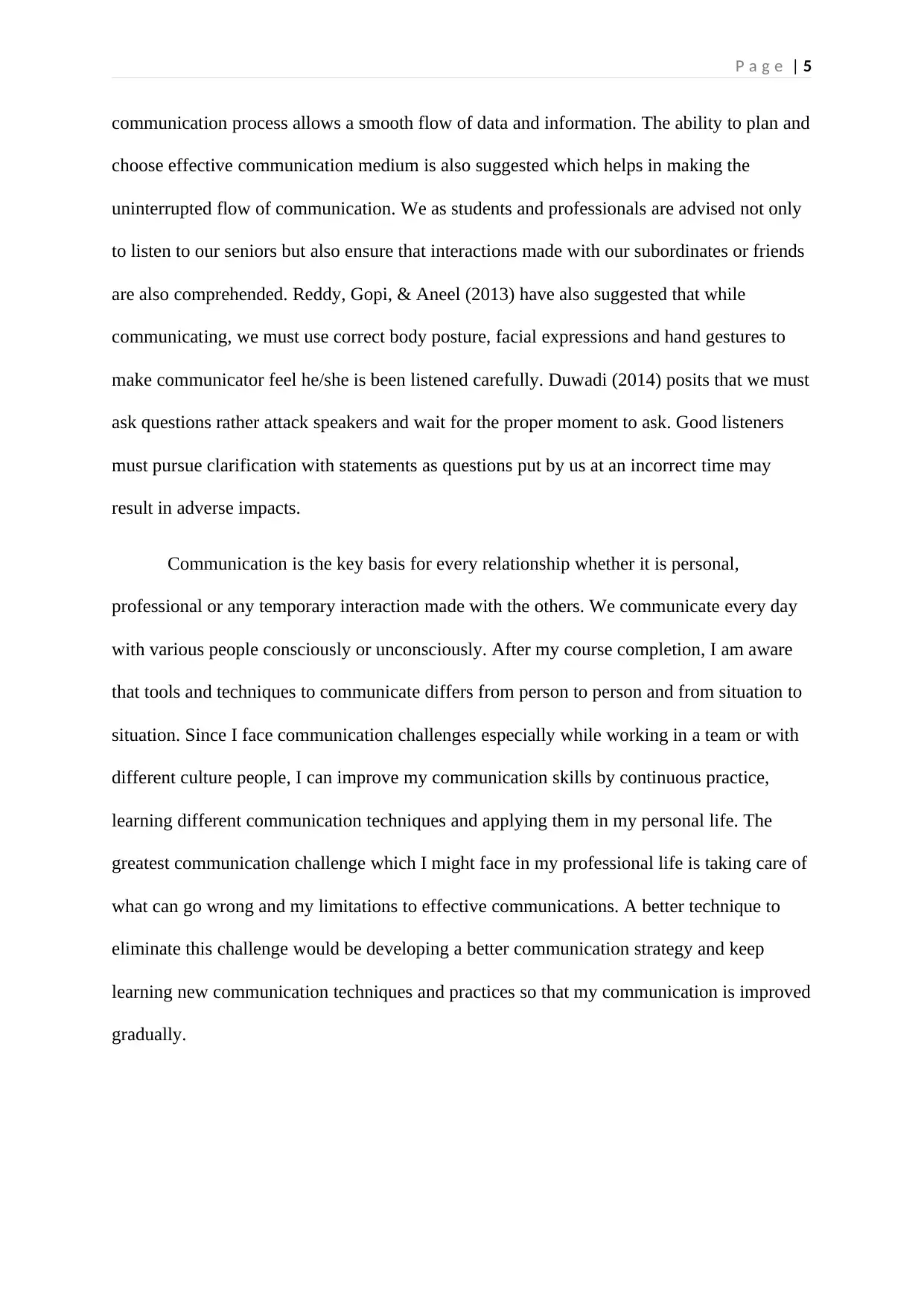
P a g e | 5
communication process allows a smooth flow of data and information. The ability to plan and
choose effective communication medium is also suggested which helps in making the
uninterrupted flow of communication. We as students and professionals are advised not only
to listen to our seniors but also ensure that interactions made with our subordinates or friends
are also comprehended. Reddy, Gopi, & Aneel (2013) have also suggested that while
communicating, we must use correct body posture, facial expressions and hand gestures to
make communicator feel he/she is been listened carefully. Duwadi (2014) posits that we must
ask questions rather attack speakers and wait for the proper moment to ask. Good listeners
must pursue clarification with statements as questions put by us at an incorrect time may
result in adverse impacts.
Communication is the key basis for every relationship whether it is personal,
professional or any temporary interaction made with the others. We communicate every day
with various people consciously or unconsciously. After my course completion, I am aware
that tools and techniques to communicate differs from person to person and from situation to
situation. Since I face communication challenges especially while working in a team or with
different culture people, I can improve my communication skills by continuous practice,
learning different communication techniques and applying them in my personal life. The
greatest communication challenge which I might face in my professional life is taking care of
what can go wrong and my limitations to effective communications. A better technique to
eliminate this challenge would be developing a better communication strategy and keep
learning new communication techniques and practices so that my communication is improved
gradually.
communication process allows a smooth flow of data and information. The ability to plan and
choose effective communication medium is also suggested which helps in making the
uninterrupted flow of communication. We as students and professionals are advised not only
to listen to our seniors but also ensure that interactions made with our subordinates or friends
are also comprehended. Reddy, Gopi, & Aneel (2013) have also suggested that while
communicating, we must use correct body posture, facial expressions and hand gestures to
make communicator feel he/she is been listened carefully. Duwadi (2014) posits that we must
ask questions rather attack speakers and wait for the proper moment to ask. Good listeners
must pursue clarification with statements as questions put by us at an incorrect time may
result in adverse impacts.
Communication is the key basis for every relationship whether it is personal,
professional or any temporary interaction made with the others. We communicate every day
with various people consciously or unconsciously. After my course completion, I am aware
that tools and techniques to communicate differs from person to person and from situation to
situation. Since I face communication challenges especially while working in a team or with
different culture people, I can improve my communication skills by continuous practice,
learning different communication techniques and applying them in my personal life. The
greatest communication challenge which I might face in my professional life is taking care of
what can go wrong and my limitations to effective communications. A better technique to
eliminate this challenge would be developing a better communication strategy and keep
learning new communication techniques and practices so that my communication is improved
gradually.
⊘ This is a preview!⊘
Do you want full access?
Subscribe today to unlock all pages.

Trusted by 1+ million students worldwide
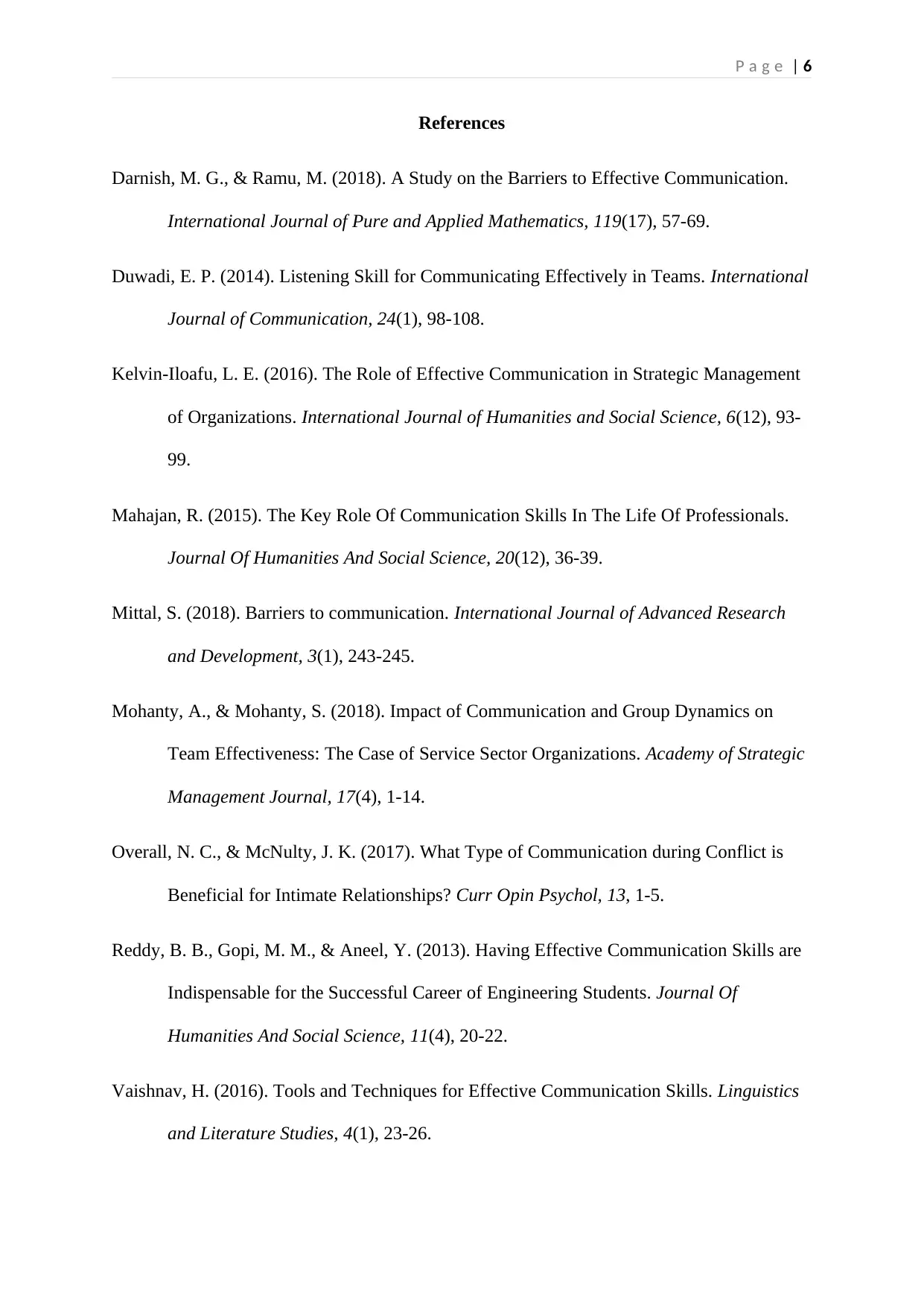
P a g e | 6
References
Darnish, M. G., & Ramu, M. (2018). A Study on the Barriers to Effective Communication.
International Journal of Pure and Applied Mathematics, 119(17), 57-69.
Duwadi, E. P. (2014). Listening Skill for Communicating Effectively in Teams. International
Journal of Communication, 24(1), 98-108.
Kelvin-Iloafu, L. E. (2016). The Role of Effective Communication in Strategic Management
of Organizations. International Journal of Humanities and Social Science, 6(12), 93-
99.
Mahajan, R. (2015). The Key Role Of Communication Skills In The Life Of Professionals.
Journal Of Humanities And Social Science, 20(12), 36-39.
Mittal, S. (2018). Barriers to communication. International Journal of Advanced Research
and Development, 3(1), 243-245.
Mohanty, A., & Mohanty, S. (2018). Impact of Communication and Group Dynamics on
Team Effectiveness: The Case of Service Sector Organizations. Academy of Strategic
Management Journal, 17(4), 1-14.
Overall, N. C., & McNulty, J. K. (2017). What Type of Communication during Conflict is
Beneficial for Intimate Relationships? Curr Opin Psychol, 13, 1-5.
Reddy, B. B., Gopi, M. M., & Aneel, Y. (2013). Having Effective Communication Skills are
Indispensable for the Successful Career of Engineering Students. Journal Of
Humanities And Social Science, 11(4), 20-22.
Vaishnav, H. (2016). Tools and Techniques for Effective Communication Skills. Linguistics
and Literature Studies, 4(1), 23-26.
References
Darnish, M. G., & Ramu, M. (2018). A Study on the Barriers to Effective Communication.
International Journal of Pure and Applied Mathematics, 119(17), 57-69.
Duwadi, E. P. (2014). Listening Skill for Communicating Effectively in Teams. International
Journal of Communication, 24(1), 98-108.
Kelvin-Iloafu, L. E. (2016). The Role of Effective Communication in Strategic Management
of Organizations. International Journal of Humanities and Social Science, 6(12), 93-
99.
Mahajan, R. (2015). The Key Role Of Communication Skills In The Life Of Professionals.
Journal Of Humanities And Social Science, 20(12), 36-39.
Mittal, S. (2018). Barriers to communication. International Journal of Advanced Research
and Development, 3(1), 243-245.
Mohanty, A., & Mohanty, S. (2018). Impact of Communication and Group Dynamics on
Team Effectiveness: The Case of Service Sector Organizations. Academy of Strategic
Management Journal, 17(4), 1-14.
Overall, N. C., & McNulty, J. K. (2017). What Type of Communication during Conflict is
Beneficial for Intimate Relationships? Curr Opin Psychol, 13, 1-5.
Reddy, B. B., Gopi, M. M., & Aneel, Y. (2013). Having Effective Communication Skills are
Indispensable for the Successful Career of Engineering Students. Journal Of
Humanities And Social Science, 11(4), 20-22.
Vaishnav, H. (2016). Tools and Techniques for Effective Communication Skills. Linguistics
and Literature Studies, 4(1), 23-26.
Paraphrase This Document
Need a fresh take? Get an instant paraphrase of this document with our AI Paraphraser
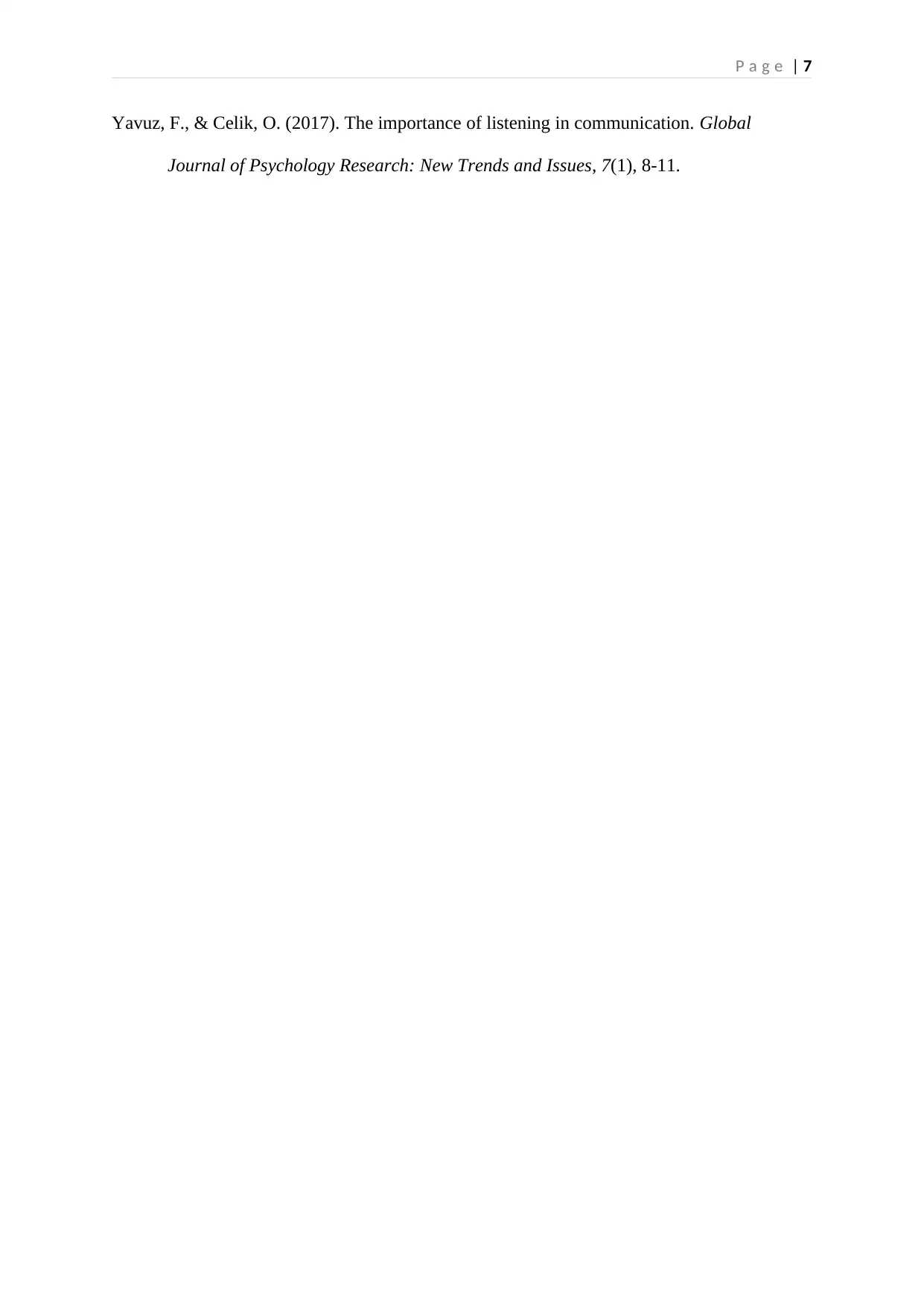
P a g e | 7
Yavuz, F., & Celik, O. (2017). The importance of listening in communication. Global
Journal of Psychology Research: New Trends and Issues, 7(1), 8-11.
Yavuz, F., & Celik, O. (2017). The importance of listening in communication. Global
Journal of Psychology Research: New Trends and Issues, 7(1), 8-11.
1 out of 8
Related Documents
Your All-in-One AI-Powered Toolkit for Academic Success.
+13062052269
info@desklib.com
Available 24*7 on WhatsApp / Email
![[object Object]](/_next/static/media/star-bottom.7253800d.svg)
Unlock your academic potential
Copyright © 2020–2026 A2Z Services. All Rights Reserved. Developed and managed by ZUCOL.





